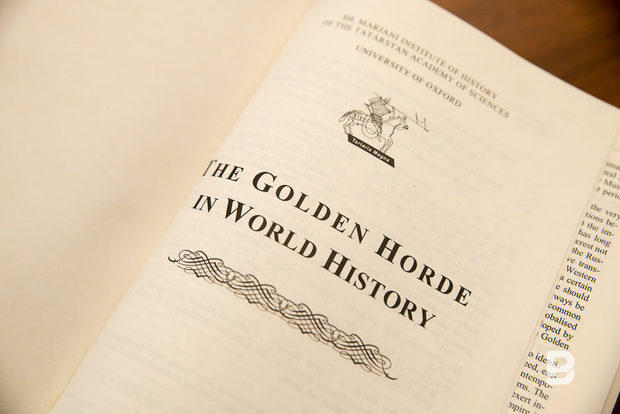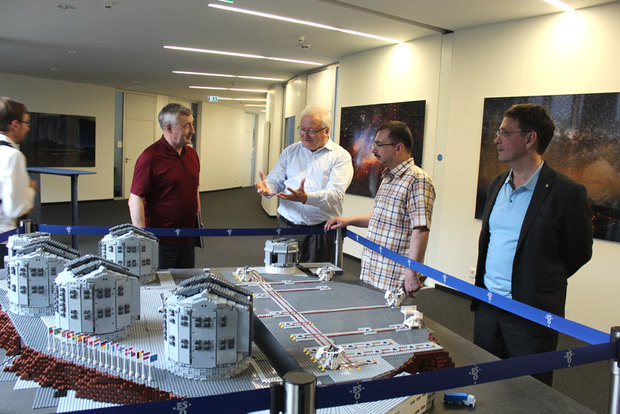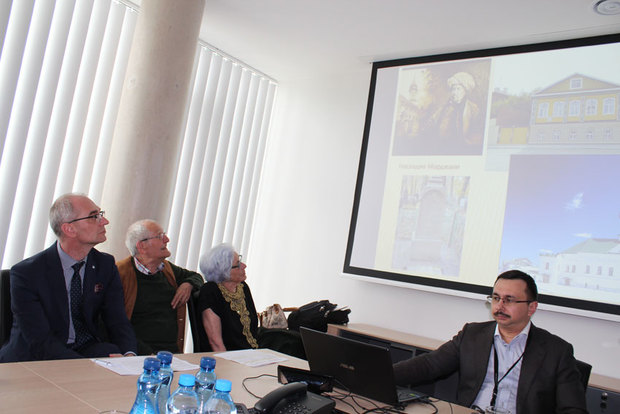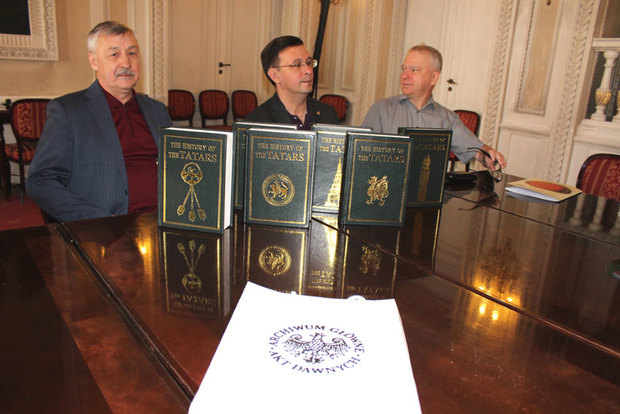Rafael Khakimov: ''In Poland, Tatars are put as an example as normal, tolerant Muslims unlike newcomers''
Total recall: Sh. Mardjani Institute of History continues studying the memorial heritage of Tatar soldiers in Europe
These days a group of Kazan scientists from Sh. Mardjani Institute of History returned from Germany and Poland. They visited the European countries at Tatarstan President Rustam Minnikhanov's instruction. They presented The Golden Horde in World History and The History of Tatars in several cities. The historians also continued their research of Tatars' graves. Director of the institute Rafael Khakimov was first to return to Kazan. In an interview to Realnoe Vremya's reporter, the historian told about his trip, meeting with astrophysicist Syunyaev, interesting findings and European Tatars.
Report for Minnikhanov
Mr Khakimov, why did you go to Gdańsk, Warszawa and Munchen this time?
There is a Tatar community in Gdańsk. It celebrated the 620 th anniversary of appearance of Tatars in Grand Duchy of Lithuania. At the same time, we presented the books The Golden Horde in World History and The History of Tatars in English at University of Gdańsk. We left files and other documents there. We combine two topics. Firstly, it is the presentation of our books in English, so that as many as possible university will know, that it so say, there is a cumulative effect. We started with Oxford and are going to distribute at universities. We would like the domino effect to start. Secondly, we simultaneously have a programme on search of Tatars and Tatarstan residents' graves in Europe linked with the First and Second World Wars. We even find graves of Napoleon's soldiers.
We also made a presentation in Warszawa but did it in the archive (Editor's Note: Central Archives of Historical Records in Warszawa (Archiwum Główne Akt Dawnych w Warszawie — AGAD) where many documents about Tatars are kept – about 350. We signed an agreement on work with this archive because they don't have people speaking the Tatar and Old Tatar languages. There is only one Polish professor at University of Warsaw, Dariusz Kołodziejczyk – he is quite an authoritative figure. This is why we want to join the interpretation of khan's yarlyks. Of course, there are more Crimean Tatars there, but there are letters from Kazan. We also visited cemeteries.

''We presented the books The Golden Horde in World History and The History of Tatars in English at University of Gdańsk.'' Photo: Maksim Platonov
In Munich, we visited Max Planck Society – the biggest scientific establishment in Europe. We were guests of great astrophysicist Rashid Syunyaev. We saw the institutes that work for him, it is a group of institutes. We made a presentation again. But there were not experts in the humanities. They know Islam, they study it. But they don't represent the Golden Horde. It turns out the Bavarian university knows about these things a bit. I left after Munich, I needed to talk to Syunyaev. And the guys went to Dresden, looked for Tatar graves that were so many throughout Saxony.
We had a pilot trip to estimate the scale of works. It was very difficult to find experts who deal with cemeteries in Poland. We were even ready to pay. In German, very Germans do it: records are kept, they know who is buried and where. In this respect, it is easier to work in Germany. But there is a great deal of graves: cemeteries are everywhere, Tatars are everywhere. There are not cemeteries without Tatars. Now we are going to prepare a report for Minnikhanov where we will describe the expected volume of research.
World No. 1 physicist
You said you met with Syunyaev. How was the meeting? Does he remember his Tatar roots?
He knows about it very well. He is quite good at history. His parents came from Penza Oblast. He was born and grew up in Tashkent. Then he went to Moscow to the Institute of Physics and Technology. He was with nuclear experts. Zeldovich (Editor's Note: Soviet physicist Yakov Zeldovich) was his teacher. It is how he grew up as a scientist. Then he worked in the Russian Space Research Institute with Sagdeyev. Of course, he knows what is going on Tatarstan. Sometimes he writes me his impressions of my articles. He is aware of what is going on in Tatarstan. He worries about many things a lot: the Academy of Sciences, the university and asks: ''Why do you have such disagreement?''

''He knows everything well enough, and the sense of national identity is very distinct. In addition, he knows history very well. So he has a good memory: he remembers everything he reads. And its scale is not planetary but space.'' Photo: татаровед.рф
Does he speak Tatar?
He understands. When you speak Tatar, he understands everything. The first deputy is his assistant – Marat Gilfanov from the Moscow Russian Space Research Institute who works in Munich. So he knows everything well enough, and the sense of national identity is very distinct. In addition, he knows history very well. So he has a good memory: he remembers everything he reads. And its scale is not planetary but space.
He is the owner of the Crafoord Prize awarded by the Nobel Committee. The Swedish king gives it. As it is known Nobel had a sad love story: his bride was stolen by a mathematician. This is why he did not include Maths and Astronomy into the Nobel Prize because of jealousness. But Syunyaev is now the world No. 1 astrophysicist. He won all the existing awards (Editor's Note: Putin awarded him the Russian Federation State Award on 13 June). He is a member of all the leading world academies.
So many wonderful discoveries
Do Germans in Bavaria know anything about Tatarstan, Tatars?
They do, of course. The prime minister is going to build a huge factory here. Minnikhanov presented him seven volumes of The History of Tatars in English. They know more about Bolgarians and Huns – that ancient period. As Bolgarians and Huns crossed this territory, the Hun part of our ancestors left in the blood of German barons.
Did you make any scientific discoveries during the trip?
I did not have scientific research there, it was more applied. There was a so-called Russian cemetery of the First World War. Tatars account for 1/3 of the people resting there. We look that there are three Catholics and one Georgian. Tatars are present in other cemeteries, maybe just less. They were very active participants of the First and Second World Wars…

''They were at the conference in Gdańsk. We did not have this goal because the World Congress of the Tatars deals with it.'' Photo: татаровед.рф
Including the wars against Napoleon…
Yes, against Napoleon. But it is unclear who fought for whom. For instance, Polish Uhlans were more for Napoleon, they were very loyal to the French emperor.
Archives are very important for us because we lack them while a great number of documents are kept in Warszawa and Magdeburg – about 400. In addition, nobody has ever seen and read them. And they did not guess what they had in the embassy of Prussia since the Golden Horde era in untouched cases. We don't know ourselves what is there. But there will certainly be some important discoveries for us.
Polish Tatars who forgot the language
Did you see local Tatars in Germany and Poland?
Farit Idelle (Editor's Note: former director of Svoboda radio's Tatar and Bashkir editorial). But he did not answer, we had written him. Though I met with him earlier. He retired, he might have gone somewhere.
There are more Tatars in Poland. Gdańsk has 150 people. The city has a monument to the Tatar soldier in a beautiful park. There is a community of Tatars there. Białystok has more – 3-4,000, they live in several villages.
Only Tatars of the last wave live in Munich.
Did former workers of Idel-Ural Legion remain in Germany?
It is unlikely. Somebody returned, somebody stayed in Belgium. Iskander Gilyazov works on it. He deliberately goes to Germany, digs in archives.

''Presentation of books to spur interest in Europe was our main goal. If this topic is mentioned at some universities, then lectures on the Golden Horde are delivered like at Oxford or Sorbonne, students, postgraduates and Ph. D candidates appear.'' Photo: татаровед.рф
Do Polish Tatars remember their language and follow religious traditions?
They are Muslims, they have a mosque. They are put as an example as normal, tolerant Muslims unlike newcomers Arabs. They don't know the language already, speak Polish, many of them know Russian. Their surnames are like Yakubosky, Asanavichus. The endings are Polish or Lithuanian depending on a place. But the roots are pure Tatar, Islamic.
Did you see many of our former compatriots in Germany and Poland who became citizens of European countries?
Not so many. They were at the conference in Gdańsk. We did not have this goal because the World Congress of the Tatars deals with it. I met some people, but not this time, in Brno, for example. When we made a presentation at Oxford, people from the Alliance of Tatars came. The majority of them are representatives of the new migration wave. There are not old people or they can't walk.
Presentation of books to spur interest in Europe was our main goal. If this topic is mentioned at some universities, then lectures on the Golden Horde are delivered like at Oxford or Sorbonne, students, postgraduates and Ph. D candidates appear. Library becomes richer because we provide electronic and paper versions. This history becomes a merit of journalists, politicians and so on through universities. It is important for us to finish this technology, to feed universities, first of all. Europe starts with universities.